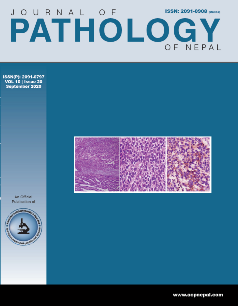Use of immunohistochemistry for detection of Epidermal growth factor receptor mutation status in lung adenocarcinoma
DOI:
https://doi.org/10.3126/jpn.v10i2.30170Keywords:
Adenocarcinoma; Epidermal growth factor receptor; ImmunohistochemistryAbstract
Background: Since the advent of targeted therapy in lung cancer, in settings where it is not possible to send for molecular testing of lung adenocarcinoma, immunohistochemistry for EGFR mutation-specific antibodies can be used as an alternative for detection of EGFR mutation.
Materials and methods: 50 lung adenocarcinoma cases were screened at the Medical University of Graz. 19 cases in which molecular test as well as immunohistochemistry were positive for EGFR mutation. Cases where immunohistochemistry results and molecular test for the E-746-A750 deletion and the L858 mutation were positive, were considered true positives. Similarly, false positives, true negatives, and false negatives were determined.
Results: The mean age of the patients was 78.6 yrs. Among 19 cases, 7 were positive for E-746-A750 deletion (7/19, 36%), among which 4 cases also showed positivity with IHC. 4 were positive for the L858 mutation (4/19, 21%), among which 3 also showed positivity with immunohistochemistry. The rest of the 8 cases were positive for EGFR mutation in other loci. The sensitivity and specificity of the immunohistochemistry test of antibody specific to E-746-A750 exon 19 deletion was 100% and 80% respectively. The sensitivity and specificity of the IHC test of Ab specific to L858 mutation was 75%, and 100% respectively.
Conclusions: Our results have been comparable to previous studies. However, our sample size was a limitation. It can still be concluded that immunohistochemistry can be a diagnostic option in low resource settings, and can aid in ensuring that patients with a positive antibody test get targeted therapy.
Downloads
Downloads
Published
How to Cite
Issue
Section
License
This license enables reusers to distribute, remix, adapt, and build upon the material in any medium or format, so long as attribution is given to the creator. The license allows for commercial use.




